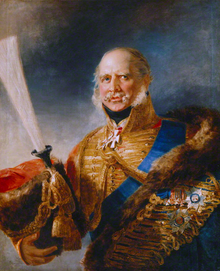Liberation

The former Electorate was liberated by Allied troops under the overall command of Marshal Bernadotte of Sweden who was operating under a large subsidy from Britain. After Leipzig Sir Charles Stewart, the British envoy to Prussia and younger brother of the Foreign Secretary Lord Castlereagh was ordered to be on the spot. [2]
The operation was concluded swiftly. [3] The liberation provoked joyous scenes across Hanover, which had resented the French occupation and retained its loyalty to George III. Stewart reported "the enthusiasm, loyalty and unbounded joy of the people is not to be described". [4] The news reached London at the same time as reports of a victory by Wellington at the Battle of Nivelle inside the borders of France. [5]
On 19 December the King's fifth son Ernest Augustus entered Hanover to popular acclaim. Stewart observed "Here was a language that spoke from the hearts which I am quite unequal to describe, and there was a loyalty and devotion displayed which would have done honour to Britons". [6] However he had no official role and his presence was a complication for Stewart and other British diplomats. [7]
Bernadotte used Hanover as his base for further advances against the French although Britain and other Allies were concerned by his slow progress. [8] The Allies crossed the Rhine in December 1813 and took part in the Invasion of France. In Hanover Count Munster was appointed Chief Minister. The Duke of Cambridge, George III's youngest son who had commanded Hanoverian troops during the failed attempt to defend Hanover in 1803, was made Viceroy. [9]
